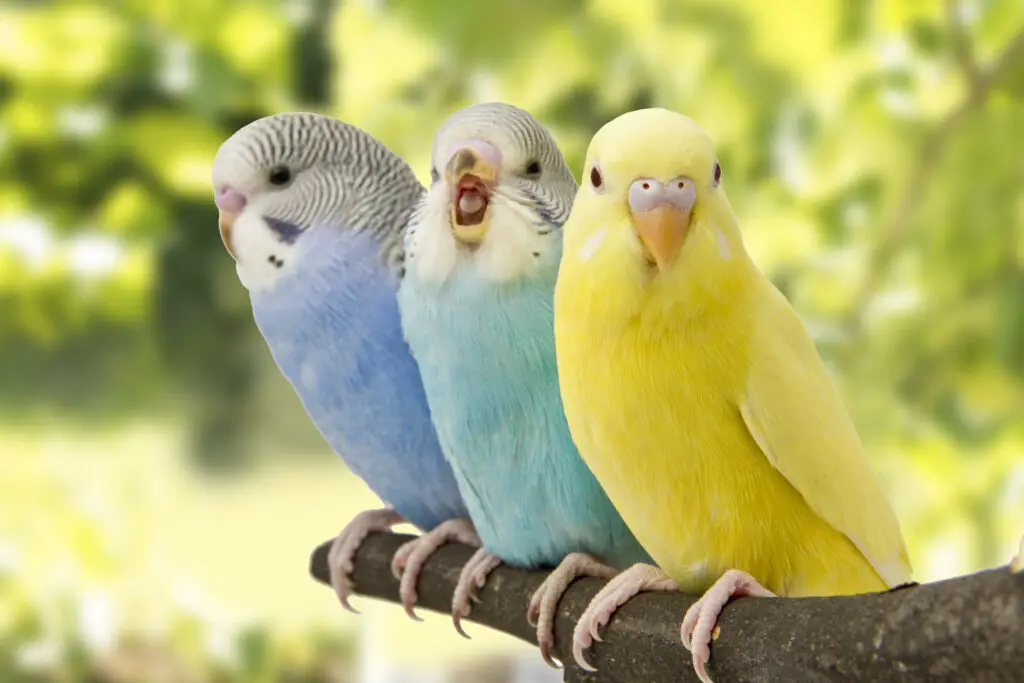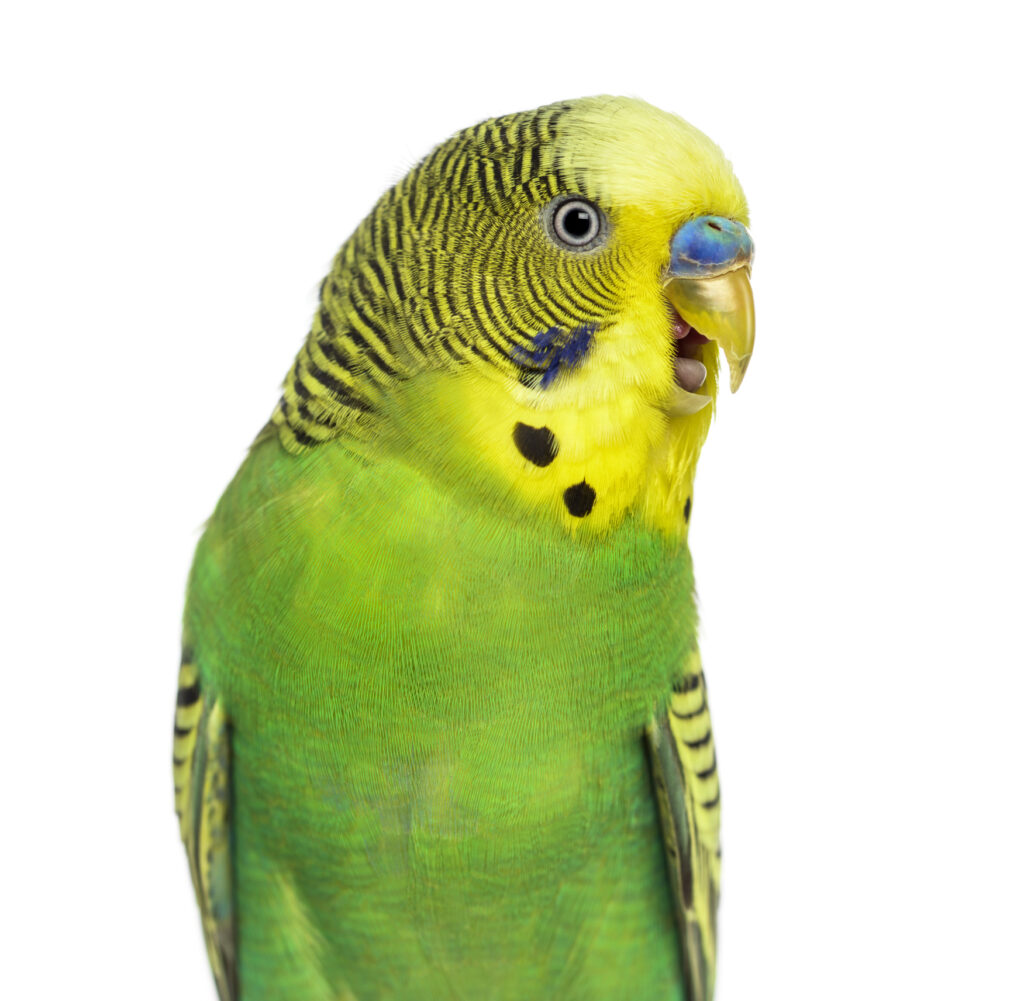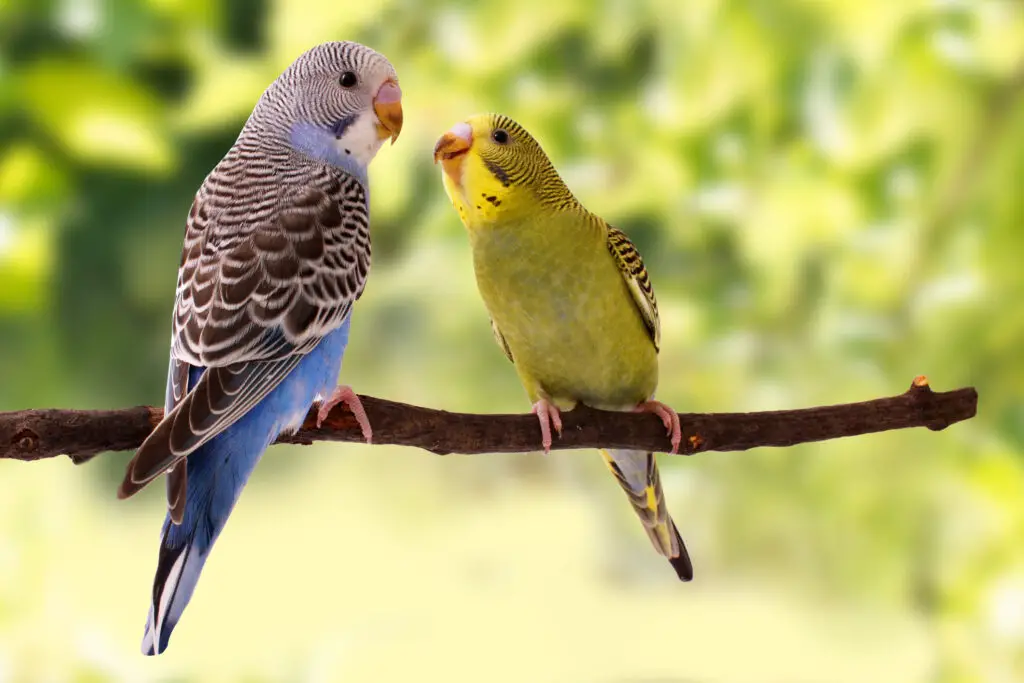Parakeets are one of the most popular birds to take care of due to their tiny size and charming nature. Their size makes them easy to care for, as they do not require as much space and food as larger birds. If you own a parakeet, chances are you know how much noises they make when they try to communicate.
You may wonder, “what are noisy parakeets trying to communicate, and what can I do to stop them from being loud?”
Key Takeaways
This article will discuss the following:
- The different noises parakeets make and what they mean
- How noisy parakeets are
- Reasons why parakeets may scream
- How to stop parakeets from being loud
- Are parakeets noisy at night?
The best way to stop a parakeet from being loud is to cover its cage to mimic its nests in the wild. You can also let it spend time outside its cage and interact with it to keep it company. Moving its location to a room where you can interact with it may also help.
Noisy parakeets can be annoying, no matter how charming pets they are. For this reason, this article will discuss what you can do to stop your parakeets from making too much noise.
Noisy Parakeets And What They Try To Communicate

Did you know that parakeets are one of the noisiest birds you can have? Their loud noises can sometimes be annoying, especially when you want a quiet environment.
But the good thing about these birds is every noise they make has something to communicate. However, a parakeet’s noise can be too much to bear regardless of what they try to communicate.
Fortunately, there are ways to deal with noisy parakeets. But before you can tone down the noise of your noisy pet, it is essential to understand what they are trying to tell you.
Common Parakeet Noises And Their Meanings
Happy Chirps
One of the noises a well-cared-for parakeet will often make is happy chirps. However, no two parakeets are the same, so you must spend time bonding with your pet to know how it chirps when it is happy.
When your parakeet is doing its happy chirps, it means it is doing well and is content with how you are taking care of it.
Unhappy Noises
Of course, it is not every time that your feathered companion will be happy. Sometimes, noisy parakeets try to signal discontent. Low noises made by parakeets are loud chirps that sound different from their usual sweet vocalizations.
Your parakeet may make unhappy noises when hungry, bored, or not getting enough attention.
Beak Grinding
Besides using their voices to make noises, noisy parakeets may also make odd sounds similar to chewing and gritting. These noises happen when these birds grind their beaks.
Beak grinding is a noise that parakeets make when they are happy. You can compare it to the purrs cats make when you give them belly rubs.
Your parakeet may also grind its beak to prevent it from overgrowing. For this reason, it is vital to regularly check your feathered companion’s beak to ensure it is healthy.
Whistling
Another sign that your parakeet is happy and feeling good is when it whistles. However, whistling is an acquired skill, so your bird can only make whistling noises if you teach it how to.
Screaming
According to a study about bird vocalizations, some birds vocalize at a much higher pitch than others, and parakeets are one of them. For this reason, their screams can be deafening, no matter how small they may be.
Screaming is a parakeet’s way of telling you it is in distress, pain, or danger. While some birds may also call when trying to mimic human language, checking on your parakeet once it screams is vital. This way, you can ensure that nothing is wrong with it.
Singing
Noisy parakeets that are happy usually combine whistles, chirps, and other noises they make when they feel good to form a song. Suppose your parakeet is living with another companion bird. In that case, they will often sing to each other to show that everything is going well.
Your parakeets may also sing to you as a sign that they like you.
Chiding
A parakeet’s chiding noise sounds similar to a hiss. It uses this sound when you or another bird is invading its personal space. Suppose you take care of multiple parakeets whose enclosure does not have enough space. In that case, they will chide at each other regularly.
You must provide a larger cage for your parakeets to prevent them from chiding all day.
Squawking
One of the main reasons why noisy parakeets squawk is because they sense danger. They may also make this noise when they are calling for your attention. For instance, if you forget to fill their water bowl, your parakeets will squawk until they get what they need.
For this reason, you need to check your parakeet immediately once you hear it making this noise.
However, danger and attention are not the only reasons a parakeet may squawk. If you own a female parakeet, it may make loud noises during its mating season.
How Loud Are Parakeets?

Parakeets may be small creatures, but they can make loud noises. They make loud noises throughout the day, whether in captivity or in the wild. In fact, the Animal And Plant Health Inspection Service of the US Department of Agriculture noted noise complaints caused by flocks of parakeets in the wild.
If you have not heard parakeets scream yet, you will be surprised by how loud these small birds’ voices are. Their scream can even sound deafening due to the high pitch of the sound they make. For this reason, a parakeet may not be an ideal pet for you if you are sensitive to sound or you need your home to be quiet most of the time.
On the other hand, usual chattering, whistling, singing, and happy noises are not as loud as the parakeet’s screams. These happy noises may even sound pleasing to the caretaker’s ears.
Reasons Why Your Parakeet Is Screaming
It is easy to know when noisy parakeets are happy – they make sounds pleasing to the ear. As mentioned, parakeets may whistle or sing when they are happy or content. However, there are various reasons why these birds may screech, scream, or chide.
Boredom
The most common reason why parakeets scream is due to boredom. Since these birds are highly active, you always need to provide them with activities and toys to keep them occupied. You also must regularly spend time with your pet to socialize them and provide them with emotional support. Seriously, birds have feelings, too, and need a friend to make them feel secure, just like people.
A bored parakeet will scream to get its caretaker’s attention. If you cannot always spend time with your feathered companion, it is ideal to regularly switch its toys so that it will always have something new to play with.
Fear
Noisy parakeets are sometimes feeling threat around them. For instance, if your other pets, such as a cat or dog, are coming near their enclosure, parakeets will see them as intruders. As a result, they will scream or squawk to get your attention and tell you something is causing them fear.
Jealousy
If you are taking care of two or more parakeets, chances are you will spend more time with one of these birds. As a result, the other parakeet will feel neglected, causing it to develop jealousy toward its pair.
One good trait parakeets have is that they can be sweet and affectionate to people they trust. However, this affectionate nature can also be an issue, as they want your attention all for themselves. So, when they see you spending time with your other pets, they will feel jealous and make annoying noises.
Noisy parakeets may also feel jealous of a person, especially if they see you spending a lot of time with this person. For this reason, your pet will try to take your attention away from whom it is jealous of by screaming.
You can stop this behavior by teaching your parakeet to become friends with the people affected by their silly behavior. Unfortunately, this trick may not work if your feathered companion is jealous of a cat or a dog, as these animals can cause them harm.
Changes In The Environment
Even a slight change in your parakeet’s enclosure can cause stress. For instance, if you introduce a new companion for your bird, it may see it as an intruder, thus causing it to feel threatened. As a result, it will scream as a response to stress.
The same thing may happen if one of your parakeet’s companions dies.
Changes in the parakeet’s environment may include a family member leaving or moving into your home. Considering how a parakeet reacts to changes, gradually introducing something new to its environment is vital.
Illness
If your parakeet is feeling ill or in pain, it will vocalize in a way that shows distress. This screaming may be due to anxiety, nutrient deficiency, poor diet, or cuts on the bird’s skin. For this reason, it is essential to observe your noisy parakeets whenever it starts screaming.
A parakeet that feels ill usually changes its behavior along with its screaming. Suppose you notice that your feathered companion behaves differently from its usual nature. In that case, it is crucial to have it checked by a veterinarian. This way, you can ensure that nothing is wrong with your pet, or if there is, the vet can give it the medication it needs.
Attention Seeking
As mentioned, your parakeet will scream if it wants to get your attention. However, it will not only display this behavior when it is bored or jealous. You can compare a parakeet to a child who tries to get an adult’s attention by screaming. It will continue calling until it receives the attention it wants.
However, giving attention to this kind of attention-seeking behavior will only worsen it. In the long run, your noisy parakeets will not stop screaming until you give in to their desires.
How Do I Stop My Parakeets From Being Loud?

A parakeet’s constant screaming, whistling, or singing can be annoying. It can even disturb your neighbors if you live in an apartment. Fortunately, there are some ways to tackle noisy parakeets.
Make Use Of A Cage Cover
According to an article published in Bird Talk Magazine, parakeets use natural tree cavities as their nests. They may even chew on decaying wood to make their nest holes. Such holes have suitable temperatures, allowing them to relax and feel sheltered.
These natural nests are far different from the enclosure you provide your parakeet in captivity.
For this reason, you may want to try covering your parakeet’s cage when they begin screaming. Chances are your feathered companion needs some time alone, which it cannot get if it constantly sees you and the environment outside its cage.
When covering your pet bird’s cage, use a thick towel and ensure that you cover the entire enclosure. Such cover will provide the darkness and temperature your bird might be seeking. If your parakeet needs to have time for itself, it will gradually stop screaming after you have covered the cage.
Let It Roam Outside Its Cage
Domesticated parakeets need time to fly around outside their cage. Being in an enclosure for an extended period can irritate them, as they require ample space to play freely. When your parakeet is screaming, and nothing looks wrong with it or its cage, it may be demanding for some time outside.
That said, close your doors, windows, and any openings where your parakeet can escape. Once you are sure there is no way your parakeet can take flight outside your home, let it roam free so it can stretch its wings and muscles. You may also set up some activities that your feathered companion will enjoy.
Allowing your parakeet to spend time in a larger environment will eliminate its boredom and prevent it from screaming.
Move The Cage’s Location
Parakeets do not like being alone. If the parakeet you care for does not have a companion bird, it must constantly see you and the other people living there. This way, your feathered companion will have an assurance that it is not alone.
Noisy parakeets need interaction. If your bird’s cage is in a room where it does not see any of your family members, it will feel lonely and isolated, causing it to scream. In this case, you need to transfer the enclosure somewhere with a lot of foot traffic.
This way, your parakeet will be able to interact with you and your family.
In addition, you need to ensure that your bird’s enclosure location is somewhere peaceful and without too much noise. Loud noises stress parakeets, so placing your pet somewhere noisy may cause it to scream more. According to The Effects of Highway Noise On Birds, overexposing a bird to loud noises can cause a gradual decrease in its hearing ability and eventually complete hearing loss.
For this reason, you should never place your parakeet in a room near a busy street.
Keep It Company
Observe whether your parakeet starts screaming when you are in the room or when you leave. If it begins to make noises when you leave the room, it is ideal to take it with you. Parakeets are intelligent, so you can efficiently train your pet to sit on your shoulder while you do your chores.
However, it is understandable that you cannot always bring your feathered companion with you. In such a case, you must train your pet to be patient. For instance, you can use phrases like “I’ll be back” to assure it that you are not leaving for good.
In time, your parakeet will understand that you will be back every time you leave.
It is also crucial to talk to your parakeet throughout the day. It does not matter if you only speak to it for short periods. You only have to ensure that it feels your presence every time you are together.
If you are leaving for long hours, leave them with toys and activities that will keep your noisy parakeets busy until you return.
Correct The Behavior
Noisy parakeets may also have a behavioral issue you may not be aware of, which you are reinforcing. If you are starting to notice that your parakeet screams to get what it wants, it is no longer ideal that you give it attention. Instead, it would be best to correct the behavior by not paying any attention to it.
Whatever happens, please do not yell at your parakeet when it is screaming. It will view your reaction as a form of attention, which may cause it to make more noise. If you are holding your parakeet and it starts screaming, put it back in its cage to show that you do not like its behavior.
Moreover, do not react like you did when it used to scream. This way, your parakeet will feel that its screaming fits are not getting any of your attention anymore. While your parakeet will still call from time to time, you can correct its behavioral issue.
Reward Good Behavior
Rewarding a parakeet every time it does something good will make it feel that you appreciate it. So, along with correcting its screaming fits, you should reward its good behavior. These rewards will encourage noisy parakeets to do something good to get your attention instead of screaming constantly.
The reward method modifies your parakeet’s attitude. But for incentives and rewards to be effective, you first need to train your parakeet on some alternatives to screaming. If it is screaming to catch your attention, you can give it a bell or teach it to sing and whistle.
When your feathered companion uses its bell or makes pleasant noises, reward it with its favorite treat or toy. You may also praise your bird when it substitutes its screams for other noises.
While this trick may not work immediately, it will be effective if you consistently use the training for noisy parakeets. In time, you will notice your pet making much less annoying noises.
Are Parakeets Noisy During The Night?
Noisy pets can be more annoying at night, no matter how much you love them. Constant screaming can ruin your sleep and interrupt your neighbors’ rest if you live in an apartment.
Fortunately, parakeets are quiet during the night. Like their caretakers, noisy parakeets sleep at night, so they will not scream like they do in the morning. However, they may still cry when they sense danger or something frightens them.
As mentioned above, the best way to keep your parakeet silent at night is to cover its enclosure with a towel or blanket. This way, they will not see anything that may scare them. But if you have other pets roaming around the house, ensure they cannot access your parakeet’s cage to prevent it from screaming.
Final Thoughts About Noisy Parakeets
Parakeets use their voices to communicate with their companion birds and caretakers. They make noises when they are happy, sad, mad, or distressed.
What do you think about this article? If you have questions, suggestions, or comments, feel free to leave them in the comments, and we will do our best to answer them.
You can prevent a parakeet from making noises by covering its enclosure, allowing it to spend time with you outside its cage, and moving its enclosure where you can constantly interact with it. You can also keep your pet busy by providing it with toys and activities.
These Articles May Also Interest You
- The Parakeet Vs. Parrotlet (A Complete Comparison)
- Can Parakeets Eat Strawberries?
- Can Parakeets Eat Blueberries?
- Parakeets And Cockatiels: Are They The Same?
- Reasons Why Parakeets Make Good Pets
- Can Parakeets Eat Watermelon?
- Can Parakeets Eat Cucumbers?
- Three Places Where Parakeets Live
- Can Parakeets Eat Grapes?
- Parakeets and Cockatiels: A Comparison
- Can Parakeets Eat Tomatoes? (Read This First!)
- 5 Reasons Why Parakeets Will Die
- Why Do Parakeets Bob Their Heads?
- When Parakeets Kiss: Why They Do It And What It Means
- Can Parrotlets And Parakeets Get Along? (Find Out Here)
- Can Parakeets Eat Carrots?
- 7 Things A Parakeet Needs
- Parakeets and Cockatiels: A Comparison
- What Does it Mean When Parakeets Puff Up?
- The Parakeet Vs. The Lovebird: The Differences Explained
- Ríos-Chelén, Alejandro A., Ambria N. McDonald, Ayala Berger, Anna C. Perry, Alan H. Krakauer, and Gail L. Patricelli. “Do birds vocalize at higher pitch in noise, or is it a matter of measurement?.” Behavioral Ecology and Sociobiology 71 (2017). DOI: 10.1007/s00265-016-2243-7. Accessed February 6, 2023.
- Klug, P.E., Bukoski, W.P., Shiels, A.B., Kluever, B.M. and S.R. Siers. 2019. Rose-Ringed Parakeets. Wildlife Damage Management Technical Series. USDA, APHIS, WS National Wildlife Research Center. Fort Collins, Colorado. https://digitalcommons.unl.edu/nwrcwdmts/23/ Accessed February 6, 2023.
- Brightsmith, Donald. Quaker Parakeets. Bird Talk Magazine (2000). http://vetmed.tamu.edu/macawproject/wp-content/uploads/sites/45/2019/03/quaker_parakeets_2000_jun.pdf. Accessed February 6, 2023.
- Dooling, R.J., Popper, A.N. The Effects of Highway Noise on Birds. The California Department of Transportation Division of Environmental Analysis (2007). Accessed February 6, 2023.




